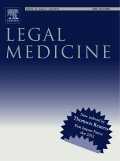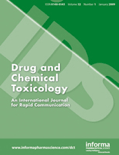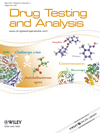
International Journal of Medical Toxicology and Forensic Medicine
Scope & Guideline
Fostering Interdisciplinary Dialogue for Better Outcomes
Introduction
Aims and Scopes
- Medical Toxicology:
The journal emphasizes studies related to various types of poisoning, including acute and chronic toxic exposures, with a focus on clinical outcomes and treatment protocols. - Forensic Medicine:
Research on forensic aspects of toxicology, including case reports and studies that investigate the medicolegal implications of toxic exposures. - Drug Abuse and Dependency:
The journal covers the toxicological effects of recreational and prescription drug use, including prevalence, treatment, and outcomes of drug overdoses. - Innovative Methodologies:
There is a notable focus on the development and application of new analytical techniques for toxicological investigations, such as GC-MS and LC-MS methods. - Public Health and Epidemiology:
Research addressing the epidemiology of poisoning incidents and drug-related health issues, particularly in specific populations or regions. - Animal Studies:
The journal includes studies conducted in animal models to understand the toxicological effects of various substances and the efficacy of potential antidotes.
Trending and Emerging
- Impact of COVID-19 on Toxicology:
A significant increase in studies examining the effects of COVID-19 on drug use patterns, poisoning incidents, and the side effects of vaccines indicates a responsive shift to current global health events. - Psychiatric and Behavioral Toxicology:
Research exploring the intersection of mental health issues, such as PTSD and substance use disorders, with toxicological outcomes is gaining prominence, highlighting the need for comprehensive care. - Nanotechnology and Drug Delivery Systems:
Emerging studies on the use of nanotechnology in drug delivery and the associated toxicological assessments are becoming more frequent, reflecting advancements in pharmaceutical sciences. - Environmental Toxicology:
There is an increasing focus on the effects of environmental toxins and pollutants on human health, particularly in relation to chronic illnesses and public health outcomes. - Personalized Medicine in Toxicology:
Research is trending towards personalized approaches in managing poisoning cases, examining genetic and biochemical markers to tailor treatment strategies.
Declining or Waning
- Traditional Pharmaceutical Toxicity:
Research specifically focused on older pharmaceuticals and their toxic effects has decreased, possibly due to a shift towards newer drug classes and novel therapeutic agents. - Basic Toxicological Mechanisms:
Studies solely focusing on basic mechanisms of toxicity without clinical or forensic implications are being published less frequently, suggesting a preference for applied research. - General Toxicology Reviews:
There is a waning interest in broad reviews of toxicology topics, with a trend towards more targeted, specific studies that provide direct clinical relevance.
Similar Journals

Toxicology and Environmental Health Sciences
Bridging Research and Practice in Environmental Health SciencesToxicology and Environmental Health Sciences is a peer-reviewed journal published by the Korean Society for Environmental Risk Assessment & Health Science, dedicated to advancing the fields of toxicology and environmental health. With an ISSN of 2005-9752 and E-ISSN 2233-7784, this journal serves as a vital platform for researchers, professionals, and students seeking to explore the intricate relationships between environmental risks and public health. Operating from South Korea, it has a converged years span from 2009 to 2024, and currently holds a respectable Q3 quartile ranking in both Health, Toxicology and Mutagenesis and Toxicology. This positions the journal within a critical space for those invested in understanding and mitigating environmental health challenges. Although not an open-access journal, it continues to foster high-impact research, contributing to a better understanding of toxicological sciences and environmental health dynamics. Engage with the latest findings and discussions that shape this evolving field through the insightful articles published herein, reinforcing its importance as a resource for scholars and practitioners alike.

Legal Medicine
Exploring the intersection of health and justice.Legal Medicine, ISSN 1344-6223, published by ELSEVIER IRELAND LTD, stands as a pivotal academic journal within the realms of forensic medicine and legal ethics. Operating from the Netherlands, this journal has established a strong reputation among researchers and practitioners since its inception in 1999, with the goal of advancing knowledge in the intersection of legal and medical disciplines. With a commendable Q2 categorization in both Issues, Ethics and Legal Aspects and Pathology and Forensic Medicine, it ranks among the noteworthy publications in these fields, placing it in the 51st percentile for Pathology and Forensic Medicine and 51st for Nursing-related ethical issues. The journal not only serves as a repository for innovative research and practical case studies but also emphasizes the importance of ethical considerations in medical legal scenarios. Although it does not offer Open Access options, it remains a crucial resource for professionals, researchers, and students seeking to stay informed about the latest developments that shape legal medicine. Access to its contents promises to enhance understanding and inspire advancements in both forensic science and the ethical frameworks surrounding them.

Egyptian Journal of Forensic Sciences
Exploring the forefront of forensic and legal studies.The Egyptian Journal of Forensic Sciences, published by the International Association of Law & Forensic Sciences, stands as a premier platform for scholarly communication in the fields of forensic science, law, and health-related social sciences. With an ISSN of 2090-536X and an E-ISSN of 2090-5939, this open-access journal, established in 2011, has garnered a reputation for its rigorous peer-review process and substantive contributions to the field. Housed in Switzerland, it boasts impressive metrics, achieving a Q2 ranking in Health (social science) and a stellar Q1 in Law, in addition to being recognized in Pathology and Forensic Medicine. With its articles accessible to a global audience, the journal encourages the exchange of innovative ideas and practices among researchers, professionals, and students who are dedicated to advancing the disciplines of forensic science and legal studies. As of 2023, it ranks in the 75th percentile in Social Sciences - Law and continues to influence both academic discourse and practical applications in the forensic domain.

ARCHIVES OF TOXICOLOGY
Leading the Charge in Toxicology InnovationARCHIVES OF TOXICOLOGY is a prestigious journal published by Springer Heidelberg, dedicated to advancing research in the field of toxicology and related disciplines. With a distinguished history dating back to 1930, this journal has continuously provided vital insights and groundbreaking studies, making it a cornerstone in the areas of health, toxicology, and medicine. Recognized for its high impact, it occupies a top-ranking position in Scopus, with remarkable quartile placements in 2023, categorizing it as Q1 in Health, Toxicology and Mutagenesis, and Q1 in Medicine (Miscellaneous). The journal highlights critical research and innovative methodologies, appealing to a diverse audience of researchers, professionals, and students committed to understanding the complexities of toxic substances and their implications for public health and environmental safety. The journal does not currently offer open access, allowing for a more traditional but rigorous peer-review process that ensures the quality and integrity of every published article. Join the global discourse in toxicological science with ARCHIVES OF TOXICOLOGY, where every contribution furthers the understanding of safety and toxicity in our world.

Forensic Toxicology
Decoding Toxicological Evidence for JusticeForensic Toxicology is a premier journal published by Springer, renowned for delivering cutting-edge research in the realms of toxicology, biochemistry, and forensic medicine. With an ISSN of 1860-8965 and an E-ISSN of 1860-8973, this journal has established itself as a significant resource for professionals, researchers, and students engaged in the analysis of toxic substances within a forensic context. Its impressive impact factor and ranking reveal its influential presence in the field, particularly as it is categorized in Q1 for Pathology and Forensic Medicine and Q2 for Biochemistry (Medical) and Toxicology. Featured articles span a wide array of topics, facilitating interdisciplinary collaboration and advancing scientific knowledge. While currently not an open-access journal, it remains accessible through institutional subscriptions. With a convergence span from 2006 to 2024, Forensic Toxicology is committed to publishing high-quality research that enhances the understanding of toxicological phenomena and their implications in forensic investigations, reinforcing its role as an indispensable resource in the scientific community.

Anil Aggrawals Internet Journal of Forensic Medicine and Toxicology
Championing Diverse Voices in Forensic ResearchAnil Aggrawals Internet Journal of Forensic Medicine and Toxicology, an esteemed publication in the field of forensic medicine and toxicology, is dedicated to disseminating innovative research and critical insights since 2000. Published by ANIL AGGRAWALS INTERNET JOURNAL FORENSIC MEDICINE & TOXICOLOGY, the journal caters to professionals, researchers, and students keen on advancing their understanding of forensic science, including its intersections with law and public health. Although it currently holds a Q4 quartile ranking in Law, Pathology and Forensic Medicine, and Toxicology, the journal provides a vital platform for underrepresented studies, encouraging a diverse range of scholarly contributions. With its open access model, the journal enhances visibility and accessibility, ensuring that valuable research can reach a wider audience. As the journal continues to evolve, it plays a crucial role in bridging theoretical knowledge and practical applications, thereby enriching the discourse within its fields of study and fostering inter-disciplinary collaborations.

DRUG AND CHEMICAL TOXICOLOGY
Bridging disciplines for safer environments.Drug and Chemical Toxicology is a well-respected journal in the fields of toxicology, pharmacology, and public health, published by Taylor & Francis Ltd. Since its inception in 1978, this journal has diligently explored the effects and mechanisms of chemical exposures on health and the environment, fulfilling a crucial role in advancing scientific understanding and safeguarding public health. The journal is indexed across prestigious databases and features an impressive array of articles categorized within the Q2 and Q3 quartiles across various categories in 2023, reflecting its significance in Chemical Health and Safety as well as Environmental and Occupational Health disciplines. With an extensive reach and a focus on interdisciplinary research, Drug and Chemical Toxicology offers a rich repository of original research, reviews, and methodological advancements, catering to a diverse audience of researchers, professionals, and students dedicated to the betterment of safety and health standards. Although not an open-access publication, its articles are widely accessible to the academic community, ensuring that critical innovations and insights are shared for the greater good.

Molecular & Cellular Toxicology
Connecting molecular insights to public health challenges.Molecular & Cellular Toxicology, published by the Korean Society Toxicogenomics & Toxicoproteomics (KSTT), is a significant journal in the field of toxicology, providing crucial insights into molecular mechanisms underlying toxic responses. With an ISSN of 1738-642X and E-ISSN 2092-8467, this journal serves as a vital platform for researchers, professionals, and students interested in the latest findings and advancements in toxicology, health, and environmental science. Although it operates under a subscription model, it maintains rigorous peer review standards, contributing to its respectable Q3 classification in Health, Toxicology and Mutagenesis, and its Q2 standing in Pharmacology, Toxicology, and Pharmaceutics. The journal, intersecting with innovative aspects of pharmacology and public health, aims to foster a deeper understanding of toxicological impacts on cellular processes and overall health. Located in Germany and supported by a dedicated editorial board, Molecular & Cellular Toxicology stands out in the academic community, encouraging interdisciplinary discourse and collaboration to address critical toxicological challenges. Engage with us for cutting-edge research that informs and shapes the future of toxicological science.

Rechtsmedizin
Exploring Innovations in Legal MedicineRechtsmedizin is a prestigious academic journal published by Springer, focusing on the critical field of forensic medicine and pathology. With a legacy dating back to 1995, this journal serves as a vital platform for disseminating advanced research and clinical findings that enhance the understanding of legal medicine and forensic science. Although it currently does not offer open access, it boasts an impressive Q3 ranking in 2023 within its category, indicative of its contribution to the field, with a Scopus rank of #149 out of 208 in Medicine, placing it within the 28th percentile of its peers. As a dedicated resource for researchers, professionals, and students, Rechtsmedizin aims to bridge the gap between clinical practice and forensic investigation, promoting the integration of scientific advancements into everyday applications within the legal context. With its location in New York City, USA, the journal remains a key player in the global discourse on forensic issues, thus inviting submissions that push the boundaries of traditional forensic methodologies and explore innovative approaches in legal medicine.

Drug Testing and Analysis
Pioneering Innovative Solutions in Drug AnalysisDrug Testing and Analysis is a leading scholarly journal published by WILEY, dedicated to advancing the field of drug testing and analytical methods. With ISSN 1942-7603 and E-ISSN 1942-7611, this journal provides a platform for the latest research in Analytical Chemistry, Pharmaceutical Science, and Environmental Chemistry, holding a prestigious reputation reflected in its Q1 and Q2 rankings across various categories in 2023. The journal promotes high-impact studies that explore innovative methodologies, with a specific focus on pharmacological and toxicological analyses, making it an essential resource for researchers, professionals, and students concerned with drug efficacy, safety, and environmental impact. With a strong commitment to quality and relevance, Drug Testing and Analysis remains at the forefront of contemporary scientific inquiry, contributing significantly to both academic and practical advancements in the industry.